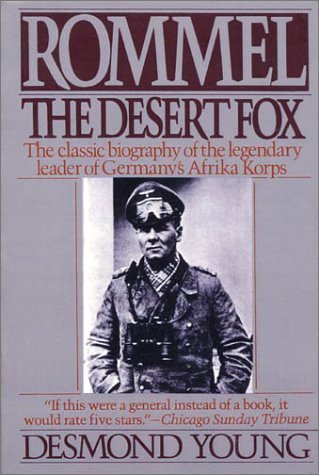What do you think?
Rate this book


264 pages, Paperback
First published January 1, 1950
Rommel by Desmond Young.
Fontana, 1965. 316 pages.
 Cover of Rommel by Desmond Young.
Cover of Rommel by Desmond Young.Rommel is a highly illuminating figure when looking at the success of Hitler in Germany up to about 1941, and at the underlying rot in the regime. Brilliant leader of men that he was, Rommel was little interested in politics, and in a sense consciously simplified his life by ignoring it. The tactical sense and discipline of him and others like him allowed the early victories and extended the Nazi empire to the corners of Europe and beyond. Slowly they came to understand the evil of their leaders -- or, perhaps more realistically, to admit it to themselves (those who did not embrace the 'new way'). For years they fell into the same trap as the bulk of the populace -- the idea that Hitler was okay but he was taking advice from bad elements, and if only one could make the Führer see what was really happening all would be all right. (Tellingly, there were no Waffen-SS units in North Africa, no Einsatzgruppen moving into the occupied areas to commit their atrocities and alert Rommel to the deeper implications of Nazi victory. How would he have reacted to the Eastern front?) But eventually he met Hitler on a bad day, got insights into the real man, and he learned. Yet only when the damage being done by Hitler's schemes became omnipresent -- in the lead up to Normandy in 1944 -- did he begin to act outside the circumscribed field of military tactics. He was the conspirators' choice for a prospective President of Germany after their coup, chosen as the only figure with enough stature who would be sufficiently respected by the Allies and viewed as sufficiently apart from the Nazi regime. High praise indeed! But when this became known to the Gestapo, Rommel, recovering from serious injuries incurred when his car was strafed by Allied planes, was given a pair of dreadful alternatives -- take poison and be given a state funeral as a hero of the Reich, becoming even in death a tool of the Nazi party, or continue to try to undermine Hitler and be killed also, but on the understanding that his family would end up dead or in concentration camps.
We see him in WWII developing the tactics of tank warfare in North Africa, where his limited fuel and the unreliability of the Italians had to be factored in to every plan. He often fought from one fuel dump to the next, fighting logistics as much as the Allies. Young is not blind to Rommel's weaknesses -- his style relied too heavily on himself, his knowing every detail and his own example as a leader, things which could not always function at every corner of the battlefield at once -- but the figure painted is an admirable one, if perhaps narrow, with few interests outside his profession.
The book is in a sense a tragedy, as we see the inevitable fate of a man of integrity within the Nazi apparatus.
This book covers his whole life, focussing of course on WWII but illustrating crucial episodes from WWI when his initiative, boldness and physical toughness marked him out as a leader of men, at least on the small scale, and meant there was room for him in the 100,000-strong inter-war army allowed by Versailles. Thus he was a professional soldier. And Young was also, which shows in his grasp of the subject matter both the details of battles and the minds of the soldiers. As a military biography is has a clarity, a sympathy and a range of insights to be admired. A necessary book for the student of WWII or of arms in general.
